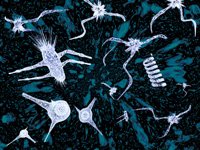
The
Netherlands Organisation for Scientific Research (NWO) has awarded Vidi
grants to Roeland Merks and Joost Batenburg. Each of them will receive
the grant that allows both reserachers to develop their own lines of
research and build up their own research groups over a five-year period.
The Vidi is one of three types of grants under the Innovational
Research Incentives Scheme of NWO.
Roeland Merks is awarded a
Vidi grant for his research project ‘Reconstructing the interactions
between cells and extracellular matrix during angiogenesis'. The
outgrowth of new blood vessels is a crucial step in physiological and
pathological processes including wound healing and tumor growth. A
better understanding of the mechanisms of blood vessel growth will help
us to steer and control blood vessel growth much more rationally in the
future. In addition to research at the molecular level, this requires
research into the interactions between the molecular level, the cellular
and the tissue level.
An important mechanism of blood vessel
growth is self-organization: blood vessel cells coordinate their
movements by deforming a surrounding protein network, the so called
extracellular matrix (ECM), and depositing signaling molecules into it.
In his research Merks will develop new numerical techniques to simulate
ECM dynamics and the interactions between cells and the ECM. The
development of new computational models of the deformation of the ECM
would mean a breakthrough in this research area. The research will take
place in collaboration with the VU medical centre and the Netherlands
Consortium for Systems Biology (NCSB).
Joost Batenburg received a
Vidi grant for his research project ‘Quantitative electron tomography
by simultaneous parameter estimation and reconstruction’. Electron
tomography is a mathematical technique for creating three dimensional
images of microscopic objects such as biological cells and
nanomaterials. The electron microscope takes several pictures of the
specimen, from varying angles. Next, these images are processed in a
complex calculation yielding a three dimensional image. In practice,
these computed images are often blurred because of a variety of
distortions during recording; for example, the specimen may shift during
recording.
In his research project Batenburg will develop
computational models that are able to determine the distorting influence
of these effects and by which three-dimensional images can be made much
more accurate. These models will help to create sharp images of
nanomaterials. Knowledge of the structure of these materials is
essential in developing more efficient solar cells and computer chips.
The
Vidi grant is targeted at excellent researchers who have completed
their doctorates and already spent some years conducting successful
post-doctoral research, thereby demonstrating the ability to generate
new ideas and bring them independently to fruition. The researchers are
among the best ten to twenty percent in their field. They will be given
the opportunity to develop their own innovative lines of research during
a period of five years.
